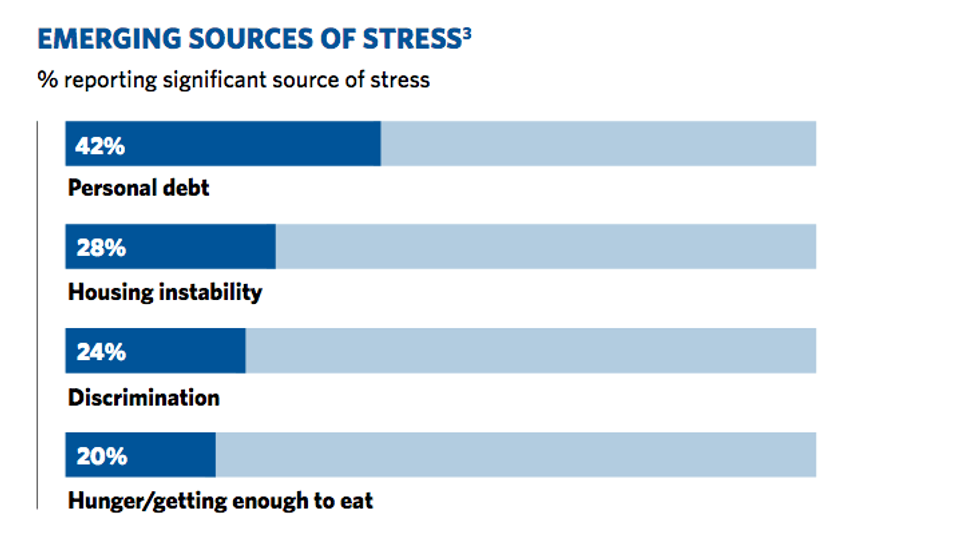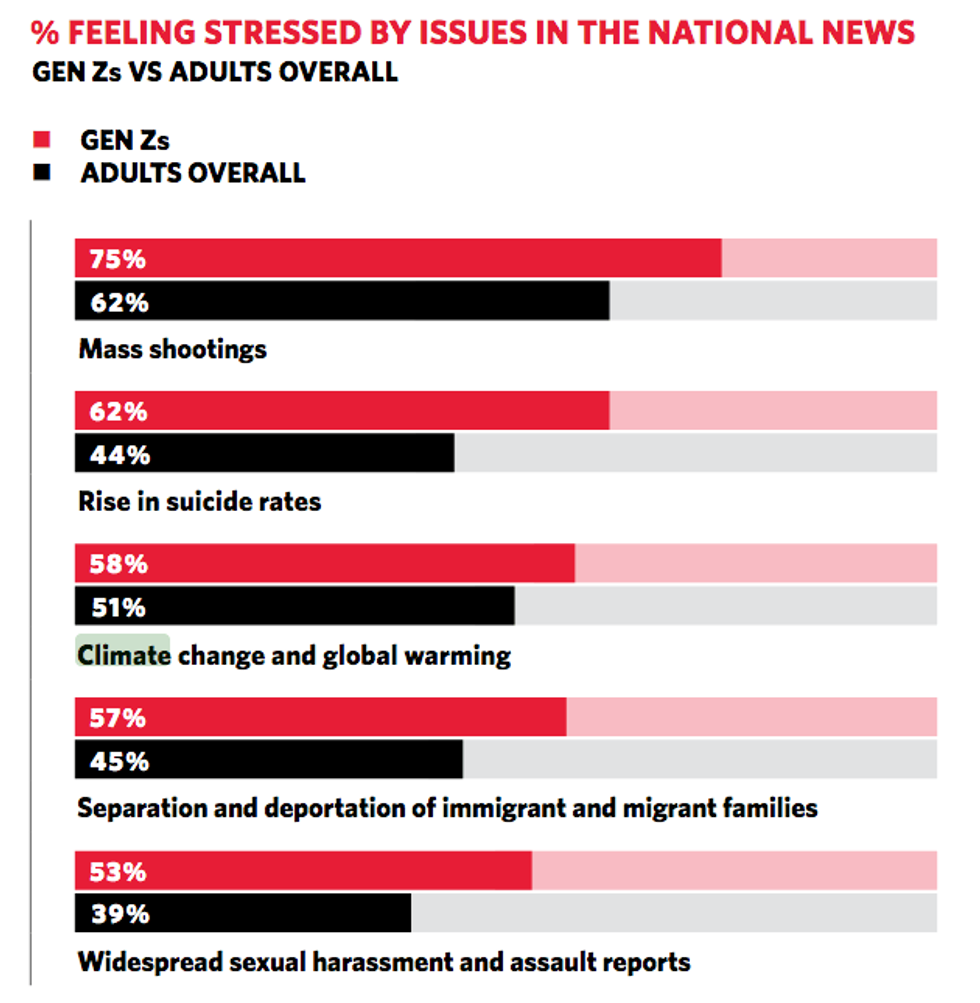
According to the American Psychological Association's survey, the political and economic stress pervading the U.S. is disproportionately affecting Americans between the ages of 15 and 21, known collectively as Generation Z. (Photo: AP)
To donate by check, phone, or other method, see our More Ways to Give page.

According to the American Psychological Association's survey, the political and economic stress pervading the U.S. is disproportionately affecting Americans between the ages of 15 and 21, known collectively as Generation Z. (Photo: AP)
While deep anxiety about mass shootings, falling standards of living, inadequate pay, and lack of healthcare long predate the Trump era, a survey by the American Psychological Association (APA) published on Tuesday found that President Donald Trump--with his bumbling incompetence, immense cruelty, and plutocratic economic agenda--has intensified the stress Americans feel about their financial situation, the U.S. political system, the climate crisis, and a variety of other issues facing the nation and the world.
Flying directly in the face of Trump's celebration of the supposed "economic miracle" his administration has produced and the president's jingoistic "make America great again" mantra, the APA's survey found that issues related to money and work continue to top the list of stressors among American adults overall.
As the wealthiest Americans and largest corporations rake in obscene profits thanks to Trump's $1.5 trillion in tax cuts, the APA found that "nearly two-thirds of adults (64 percent) reported money and work each to be a stressor."
Personal debt, housing instability, discrimination, and hunger were among the specific sources of stress reported by a sizeable percentage of Americans.
Though these stessors are hardly new, Trump and the Republican Party's efforts to hike rents on poor Americans, encourage discrimination against minorities and the LGBTQ community, and take food stamps from millions have likely contributed to Americans' growing anxiety.

More broadly, APA found that 62 percent of Americans are stressed by the current political climate--up from 57 percent in 2016--and 69 percent are anxious about the future.
"Most Americans (61 percent) also disagreed that the country is on a path to being stronger than ever," APA notes. "Because of their concern for the state of the nation, nearly half of Americans (45 percent) said they feel more compelled to volunteer or support causes they value."
According to APA's survey, the political and economic stress pervading the U.S. is disproportionately afflicting Americans between the ages of 15 and 21, known collectively as Generation Z.
"Specifically, 75 percent of Gen Z members said that mass shootings are a significant source of stress," the APA notes. "Gen Z members are also more stressed than adults overall about other issues in the news, such as the separation and deportation of immigrant and migrant families (57 percent of Gen Z vs. 45 percent of all adults reported the issue is a significant source of stress), and sexual harassment and assault reports (53 percent vs. 39 percent)."
In addition, 58 percent of Gen Z members reported that climate change is a source of stress in their lives, compared to just 51 percent of adults overall. This finding comes just weeks after a United Nations climate report warned that the world must cut carbon emissions in half by 2030 to avoid global catastrophe.
Far from confronting these alarming findings with the necessary urgency, the Trump administration has continued to reject credible science and brush aside its dire predictions as a mere overreaction.

Donald Trump’s attacks on democracy, justice, and a free press are escalating — putting everything we stand for at risk. We believe a better world is possible, but we can’t get there without your support. Common Dreams stands apart. We answer only to you — our readers, activists, and changemakers — not to billionaires or corporations. Our independence allows us to cover the vital stories that others won’t, spotlighting movements for peace, equality, and human rights. Right now, our work faces unprecedented challenges. Misinformation is spreading, journalists are under attack, and financial pressures are mounting. As a reader-supported, nonprofit newsroom, your support is crucial to keep this journalism alive. Whatever you can give — $10, $25, or $100 — helps us stay strong and responsive when the world needs us most. Together, we’ll continue to build the independent, courageous journalism our movement relies on. Thank you for being part of this community. |
While deep anxiety about mass shootings, falling standards of living, inadequate pay, and lack of healthcare long predate the Trump era, a survey by the American Psychological Association (APA) published on Tuesday found that President Donald Trump--with his bumbling incompetence, immense cruelty, and plutocratic economic agenda--has intensified the stress Americans feel about their financial situation, the U.S. political system, the climate crisis, and a variety of other issues facing the nation and the world.
Flying directly in the face of Trump's celebration of the supposed "economic miracle" his administration has produced and the president's jingoistic "make America great again" mantra, the APA's survey found that issues related to money and work continue to top the list of stressors among American adults overall.
As the wealthiest Americans and largest corporations rake in obscene profits thanks to Trump's $1.5 trillion in tax cuts, the APA found that "nearly two-thirds of adults (64 percent) reported money and work each to be a stressor."
Personal debt, housing instability, discrimination, and hunger were among the specific sources of stress reported by a sizeable percentage of Americans.
Though these stessors are hardly new, Trump and the Republican Party's efforts to hike rents on poor Americans, encourage discrimination against minorities and the LGBTQ community, and take food stamps from millions have likely contributed to Americans' growing anxiety.

More broadly, APA found that 62 percent of Americans are stressed by the current political climate--up from 57 percent in 2016--and 69 percent are anxious about the future.
"Most Americans (61 percent) also disagreed that the country is on a path to being stronger than ever," APA notes. "Because of their concern for the state of the nation, nearly half of Americans (45 percent) said they feel more compelled to volunteer or support causes they value."
According to APA's survey, the political and economic stress pervading the U.S. is disproportionately afflicting Americans between the ages of 15 and 21, known collectively as Generation Z.
"Specifically, 75 percent of Gen Z members said that mass shootings are a significant source of stress," the APA notes. "Gen Z members are also more stressed than adults overall about other issues in the news, such as the separation and deportation of immigrant and migrant families (57 percent of Gen Z vs. 45 percent of all adults reported the issue is a significant source of stress), and sexual harassment and assault reports (53 percent vs. 39 percent)."
In addition, 58 percent of Gen Z members reported that climate change is a source of stress in their lives, compared to just 51 percent of adults overall. This finding comes just weeks after a United Nations climate report warned that the world must cut carbon emissions in half by 2030 to avoid global catastrophe.
Far from confronting these alarming findings with the necessary urgency, the Trump administration has continued to reject credible science and brush aside its dire predictions as a mere overreaction.

While deep anxiety about mass shootings, falling standards of living, inadequate pay, and lack of healthcare long predate the Trump era, a survey by the American Psychological Association (APA) published on Tuesday found that President Donald Trump--with his bumbling incompetence, immense cruelty, and plutocratic economic agenda--has intensified the stress Americans feel about their financial situation, the U.S. political system, the climate crisis, and a variety of other issues facing the nation and the world.
Flying directly in the face of Trump's celebration of the supposed "economic miracle" his administration has produced and the president's jingoistic "make America great again" mantra, the APA's survey found that issues related to money and work continue to top the list of stressors among American adults overall.
As the wealthiest Americans and largest corporations rake in obscene profits thanks to Trump's $1.5 trillion in tax cuts, the APA found that "nearly two-thirds of adults (64 percent) reported money and work each to be a stressor."
Personal debt, housing instability, discrimination, and hunger were among the specific sources of stress reported by a sizeable percentage of Americans.
Though these stessors are hardly new, Trump and the Republican Party's efforts to hike rents on poor Americans, encourage discrimination against minorities and the LGBTQ community, and take food stamps from millions have likely contributed to Americans' growing anxiety.

More broadly, APA found that 62 percent of Americans are stressed by the current political climate--up from 57 percent in 2016--and 69 percent are anxious about the future.
"Most Americans (61 percent) also disagreed that the country is on a path to being stronger than ever," APA notes. "Because of their concern for the state of the nation, nearly half of Americans (45 percent) said they feel more compelled to volunteer or support causes they value."
According to APA's survey, the political and economic stress pervading the U.S. is disproportionately afflicting Americans between the ages of 15 and 21, known collectively as Generation Z.
"Specifically, 75 percent of Gen Z members said that mass shootings are a significant source of stress," the APA notes. "Gen Z members are also more stressed than adults overall about other issues in the news, such as the separation and deportation of immigrant and migrant families (57 percent of Gen Z vs. 45 percent of all adults reported the issue is a significant source of stress), and sexual harassment and assault reports (53 percent vs. 39 percent)."
In addition, 58 percent of Gen Z members reported that climate change is a source of stress in their lives, compared to just 51 percent of adults overall. This finding comes just weeks after a United Nations climate report warned that the world must cut carbon emissions in half by 2030 to avoid global catastrophe.
Far from confronting these alarming findings with the necessary urgency, the Trump administration has continued to reject credible science and brush aside its dire predictions as a mere overreaction.
